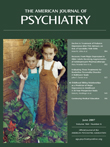To The Editor: The authors comment on the validity of the case presented for meeting criteria for ADHD in light of substance abuse in general and marijuana abuse in particular. For teaching purposes, the case purposely left some areas vague, since it is illustrative of a typical presentation of ADHD in a young adult with marijuana use disorder. While in a perfect world, it would be nice to have adults present with an established childhood diagnosis with evidentiary documentation and completed full-structured interviews on their first-degree relatives, such data are not available in clinical practice. Epidemiological evidence clearly indicates that most adults with ADHD are neither diagnosed nor treated for their condition and that ADHD is not a trivial disorder with substantial impairment
(1) . Hence, practitioners must evaluate the presence of symptoms and not make a formal diagnosis of ADHD in the parents of individuals being assessed indirectly for the disorder, which is often the case for substance use disorders. The idea that not all inattention is ADHD is obvious; however, if you can elicit a history of a longitudinal track of a cluster of attentional- and/or hyperactive/impulsive-based symptoms in childhood that are associated with impairment and exist at times when there is no substance abuse, a multiplicity of studies have demonstrated the validity of the retrospective diagnosis of ADHD in adults
(2,
3), even in the presence of substance use disorders
(4) . In the illustrative case that I presented, the ADHD symptoms can be tracked well into junior high school—a time when neither marijuana nor other psychiatric comorbidity was present—establishing a long history of ADHD symptoms and associated dysfunction
(4) . The authors’ single-survey study of stimulant abusers does not settle the issue of whether concurrent marijuana use is the causative agent in all attentional-based dysfunction and all psychostimulant abuse. For instance, it has been reported that approximately 20% of adults with substance use disorders and 40% of cannabis abusing adolescents have an ADHD diagnosis after detoxification from marijuana
(5,
6) (www. CSAT.gov). The authors lack data to support their contention that a diagnosis of ADHD can only be made with confidence after prolonged abstinence from nonmedical drug use. Unlike other comorbid disorders that are difficult to disentangle from substance use disorders, ADHD, by definition, predates substance use (onset ≤7 years old) and is a chronic disorder; there are no “attacks” of ADHD. Further, adults with ADHD who have been diagnosed with past and current substance use disorders compared with those diagnosed with no substance use have been shown to have similar characteristics, such as a family history of ADHD, neuropsychological disturbance, and functional impairments associated with ADHD symptoms
(4) . Moreover, inspection of treatment studies of substance use disorders and ADHD shows a stable persistence in the symptoms of ADHD independent of the fluctuation of substance use throughout the trial
(7 –
10) .
In terms of the treatment of substance use disorders, while abstinence is of course preferred, a number of studies that the authors do not mention show that ADHD is not benign when comorbid with substance use. The idea that only absolute abstinence is acceptable prior to initiating other treatment is ideologically based and does not appreciate that ADHD predicts earlier-onset substance use, more severe substance use, a longer course and less remission from substance use, and lower retention rates in the treatment of substance use
(11 –
14) . A number of innovative initiatives in this area that have led to newer guideline recommendations to treat ADHD in substance use disorders, after remission or stabilization of the substance use, have been established
(14,
15) . This practice of treating ADHD in context with “stabilized” substance use has been recently shown to have a positive impact on improving the outcomes of substance use disorders
(10) and is being evaluated currently in a large multisite National Institute on Drug Abuse study of adolescents with ADHD and substance use disorders. In this regard, there are a number of new options that could be used to accomplish these goals at different stages of substance use recovery, including effective nonstimulants.

